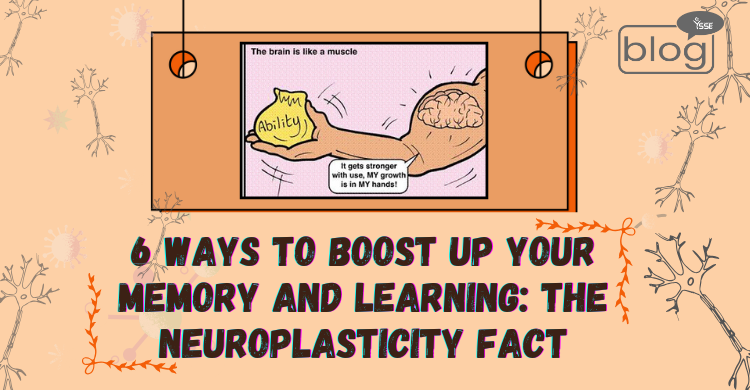What happens when you forget the topics from a lecture you just attended? Does the crippling anxiety ever build up to your nerves, finding yourself forgetting the answers sitting in a test, which you learned just the night before? I’m sure you faced such a moment, as it can not be just me!! Learning or memorizing things has always been difficult for people in their 20’s, especially when they do not know the right techniques. What does this ‘Neuroplasticity‘ have to do with our learning and memorizing effectively?
Let’s say you joined a basketball club to learn something new. Now, at first, your muscle memory won’t know how to throw that ball into the basket precisely. But through continuous repetition and practice, you create a neural pathway in your brain. The neurons work together to achieve a goal by reorganizing, changing, or growing new neural networks. This phenomenon is called Neuroplasticity, which is the foundation for memory improvement and learning enhancement based on our activities or experiences.
Let’s take you through 6 crucial points that are a must to follow in case you want your grades to shine and a memory that runs fast through the proper wiring of your neurons :
Attention:
In recent days, almost half of the population has faced attention deficits regularly. You’ll find yourself reading the same paragraph twice or rewinding a video just because you need to pay attention. Now, the greatest enemy of your attention lies just there beside you. Doom-scrolling your social media for countless hours causes an attention deficit. Studies show that our mind is designed to perform one task at a time. Spend 1-2 hours on your social media platform to prolong your attention span. For short-term memory retention, do some moderate exercises for 10-20 mins at each break. Ex- going for a walk, climbing stairs or skipping. Take some rest following that. Such an activity increases the size of the hippocampus by creating new brain cells.
Alertness:
Notice how you doze off while attending a lecture or reading some serious article. Now, that’s the time you need alertness to get you back on track. Try using the Wim Hof breathing method to increase energy flow and reduce stress. Pouring a bucket of cold water right over your head will also generate useful results. No! I’m not kidding at all. If you want to avoid such a shock, get a good adrenaline rush after one study session by doing something that excites you or go for some risky activity. Studies show that caffeine intake before and after a task increases alertness. That is for sure, without the sugar in it!
Sleep:
Yes, we cannot avoid this, no matter how much we have to pull an all-nighter to cram all those big chunks of information or articles for the exam the following day. Memory becomes more stable during deep states of sleep. Sleep deprivation, however, obstructs the creation of neural pathways for the newly retained information. It doesn’t spare your learning and attention as well as decision-making capability. Hence, to help your memory consolidation process and to make it long-term, do not miss your good night’s sleep each day.
Repetition:
Consider the analogy of a forest. Suppose you travel from point A to point B without a pathway. Now, traveling the path regularly and on repetition, your brain will be able to recognize the routes next time. This happens when you go through any of your tasks, work or study on repetition. It is the key to creating new neural pathways and reinforcing learning. Read the materials provided right after the class and take notes on them. Then, go through that note on repetition every week until the exam. There you got the tip to stop all those anxieties from crippling your nerves.
Breaks:
Here comes, at last, the necessity of taking a break. Oh no, not for 1-2 hours of Facebook scrolling. But for 20-40 minutes of relaxation with no distraction. It provides the brain the scope to replay all the newly acquired information. In the meantime, BE AWARE of reading anything else. Exposure to some other information may destroy the intake of information just acquired. Take yourself for a walk or take a good 30-minute nap. This will boost your memory 20 times more than usual.
Say no more to all those pessimistic thoughts that pull you back from having the greatest academic comeback. Now that you know how to boost your learning and memory by focusing on Neuroplasticity, please do not waste time improving it every second. Your brain is like a supercomputer that can perform all your desired tasks. It can land us in our most desired job, position, and even on the moon! Hence, use the tips above and mark this time for your growth and success.
To read more blogs like this click here.
Writer
Alima Zaim
Intern, Content Writing Department
YSSE.

